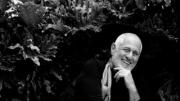Architect Richard Saul Wurman’s passion in life is making complex information easy to understand. Wurman, creator of the popular TED conferences on “ideas worth spreading,” has published, written, and designed more than 80 books on subjects ranging from football to healthcare to city guides—all topics he initially had difficulty understanding himself. He will speak at the Graduate School of Design’s Class Day ceremony on May 29.
“There is only one God that I serve and that is the God of Understanding,” Wurman said in an interview with Infodesign.com in 2004. “If you serve that God, all the others will be taken care of. My quote is: ‘The only way to communicate is to understand what it is like not to understand.’ It is at that moment that you can make something understandable.”
Described by Fortune magazine as an “intellectual hedonist with a hummingbird mind,” Wurman created and chaired the TED conference from 1984 through 2002, bringing together many of the world’s pathbreaking thinkers to share their ideas and spark discussion. The first conference, organized by Wurman and businessman Harry Marks in 1984, featured demonstrations of the Sony compact disc and one of the first demonstrations of the Apple Macintosh computer. Initially, TED speakers came from the fields of expertise behind the acronym (technology, entertainment, and design), but during the 1990s, the conference broadened to include philosophers, religious leaders, philanthropists, and others.
A recipient of the Smithsonian Institution’s Lifetime Achievement Award in 2012, Wurman has also been awarded a Gold Medal from AIGA, a Guggenheim award and the annual Gold Medal of Trinity College, Dublin. Born in 1935, he published his first book, featuring models of 50 world cities on a uniform scale at the age of 26, and subsequently created the ACCESS city guides, using graphics and logical editorial organization to make large cities like Tokyo and New York understandable to visitors. His most recent book, 33: Understanding Change and the Change in Understanding, follows the adventures of an eccentric character: the Commissioner of Curiosity and Imagination.
Last September, Wurman unveiled his latest creation: the WWW.WWW Conference, “a celebration of improvised conversation,” that took place last year in Redlands, California. Wurman told to the Brown Political Review last year: “I get really extraordinary people and I pair them in a way that I think has the chance of exposing some threads that are of particular interest and maybe…are things I’ve never thought of before. So I might have a top columnist, like David Brooks, who’s conservative, who’s on television a lot on all these panels, on the op-ed page of The New York Times all the time, and I might pair him with Matt Groening, who created The Simpsons.”
“I put two small couches close together on a stage and invited extraordinary people that I know,” he told The University Observer, the student newspaper of the College of Dublin, last year. “Many of them didn’t know each other and they just faced each other, not the crowd. I opened the conference by saying: ‘Welcome to the great leap backwards. This whole conference could have taken place 2,500 years ago in Greece with Aristotle and Plato talking.’
“There were no rules,” he added. “They spoke for 18 minutes, five minutes, an hour. There was no schedule. I was the schedule. I sat in on conversations and when I got bored told them to move on. It was improvisation, intellectual jazz.”









